Could A Depreciation Schedule Help Save You Money?
If you’re not claiming depreciation on your investment property you could be missing out on significant tax savings.
If you’re investing in property, you could be entitled to save on tax by claiming depreciation. In fact, some canny investors take depreciation into account before even putting in an offer on a property.
But to claim depreciation, you’ll first need a depreciation schedule. So if you’d like to know how to do that - and who can do it for you - please read on.
How A Depreciation Schedule Could Save You Tax
Generally, the ATO lets property investors deduct the cost of depreciation from their overall income. This means, as a property investor, you could be enjoying significant tax savings at the same time as your property investment grows.
What Can You Claim Depreciation On?
There are generally two types of depreciating assets that you can claim: plant and equipment, and capital works.
Plant and equipment refers to the items in your property that decline in value over time. This includes the carpet or flooring, curtains, appliances and - if your property is furnished - potentially even furniture.
Capital works refers to any extension, alteration or improvements you undertake. This can even include renovations. You may also be able to claim structural work or earthworks.
How Do You Claim Depreciation?
You won’t be able to make your claim for depreciation in one hit. Instead, just as the value of many items declines slowly over time, you’ll need to deduct a percentage of the total cost each year.
If you want to claim depreciation you’ll also need to put together a formal depreciation schedule. This sets out every depreciating asset in your home.
How Do You Know If You’re Eligible To Claim Depreciation?
Most investment property owners are entitled to claim some for of depreciation. That said, since new rules were brought in on 1 July 2017 investors who buy an established property can’t claim the depreciation on any assets included in their purchase until they sell. They can, however, still claim depreciation for capital works, as well as for any assets they replace in the property.
If you buy a new property, buy through a company structure, or buy a commercial property, these changes won’t apply to you.
When Should You Get A Depreciation Schedule Drawn Up?
You should ask for a depreciation schedule when you purchase a property, complete any work or buy any assets. After all, the newer something is, usually the higher its value and the more its price will decline.
Alternatively, if you already have an investment property and don’t have a depreciation schedule you should obtain one as soon as possible, or you could be missing out on tax savings right now.
Who Can Prepare A Depreciation Schedule?
If you think your accountant can draw up your depreciation schedule, think again. You’ll need to engage a properly qualified construction professional - such as a quantity surveyor - to perform the task.
Our strategic partner, MCG Quantity Surveyors, can work with you to develop a comprehensive depreciation schedule that takes into account all the depreciation on your investment property so that you reduce your tax and maximise your income and cash flow.
Contact our team of specialists today to discuss how you could benefit from a depreciation schedule.
